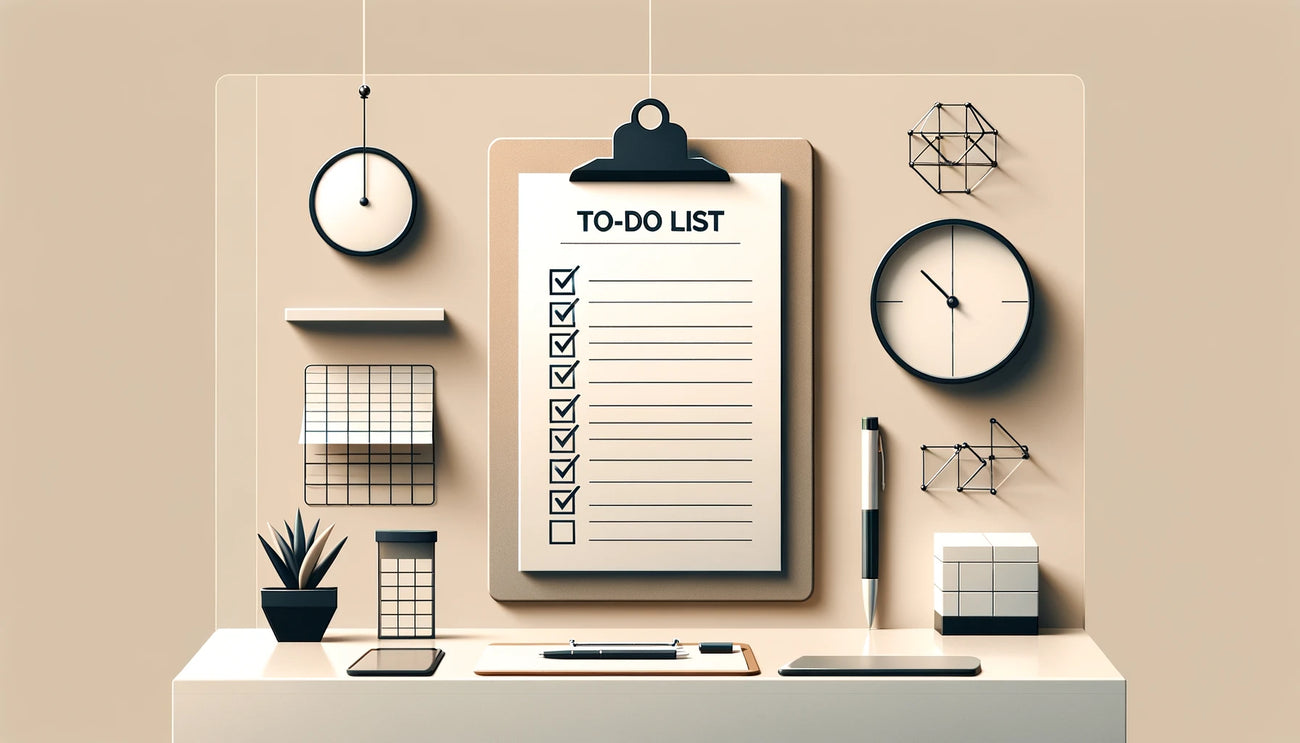
13 Simple Ways to Get Your Life Together

Table of contents:
In today’s fast-paced world, 82% of individuals have a hard time managing their time effectively. From finding balance and organizing your life, getting your life together can seem like a daunting task. However, with a strategic approach and the right mindset, it’s entirely possible to turn chaos into harmony.
This guide lays out 13 impressive and easy strategies to help you streamline your daily routines and get your life together, prioritize your mental and physical well-being, and ultimately, lead a more productive and fulfilling life.
At Soda Sense, we are more than just a company; we are a community of health-conscious individuals dedicated to transforming lives. Our mission is to empower people everywhere to live more healthy and sustainably, recognizing the profound impact that daily choices can have on our personal well-being and the planet.
We believe in making healthier lifestyle choices accessible and enjoyable and that begins with simplifying routines and creating balance in our everyday lives.
How to Get Your Life Together: 13 Effective Ways
At a glance, we will dive further into the following "get your life together checklist" in the article below where you will learn how to get your life together in simple yet effective ways.
Let's get into the nitty-gritty on these top 13 ways on how to get your life together.
1. Make your health a priority
Taking care of your physical and mental health is the foundation of getting your life together. A few ways you can do this is by engaging in regular exercise, which not only improves your physical fitness but also alleviates symptoms of depression and anxiety, consuming a balanced diet by nourishing your body with foods that energize and heal, and ensuring you get adequate sleep each night. A good night's sleep rejuvenates the body and mind, preparing you for the challenges of the next day.
Things like assessing your mental state, practicing mindfulness, and seeking professional help when necessary can make a significant difference in your overall mental health. Incorporating activities that relax and recharge you, be it reading, meditating, or spending time in nature, is fundamental. Remember, prioritizing your health isn’t selfish; it’s necessary for a fulfilling life.
2. Create a realistic financial plan
Creating a financial plan means taking a comprehensive look at your income, expenses, debts, and investments to map out your financial future. Start by setting clear, achievable financial goals, whether that’s paying off debt, saving for a down payment on a house, or building an emergency fund. Then, create a budget that allocates your income towards these goals while covering essential expenses.
Understanding where your money goes each month is empowering and can help you make informed decisions that bring you closer to your financial objectives. Staying disciplined, but flexible, with your financial plan allows you to adjust as your life circumstances change, ensuring you remain on track towards achieving financial stability and independence.
In today’s digital age, numerous tools and resources are available to assist you in handling your finances more efficiently. Apps that track spending, savings apps that round up your purchases, and investment platforms can automate much of the heavy lifting, making it easier for you to stay committed to your financial plan. Remember, financial well-being is a key component of a balanced life, and taking proactive steps toward managing your money can significantly reduce stress and anxiety.

3. Declutter your space
Decluttering your space is not just about creating a more aesthetically pleasing environment; it's about clearing mental clutter and making room for new and positive energies to enter your life. Begin by separating your belongings into categories such as 'keep,' 'donate,' 'sell,' or 'discard.' Tackling one room at a time prevents the process from becoming overwhelming and allows you to see immediate progress.
Remember, decluttering is not a one-time task but a continuous process that requires regular revisiting to maintain a balanced and organized environment. A study in 2020 found that dopamine could be a direct link to whether the brain decides if a task is worth the effort. If dopamine is released through gratification of a task being completed, it's more likely that the brain will value the task, such as decluttering, as valuable and will be less likely to burn out.
Additionally, decluttering can be an empowering act of letting go of the past—by discarding items that no longer serve you, you're metaphorically making room for new experiences and opportunities. As you progress in your decluttering journey, you might find a newfound appreciation for the items you choose to keep, leading to a more mindful and intentional lifestyle.
Don't get rid of that soda maker in your closet! Check out these delicious sparkling water recipes to make from home and start exchanging CO2 a better way.

Want more? Download our free worksheet with templates!
4. Set goals, the realistic kind
Goals give you direction, focus, and a benchmark for measuring progress. However, it's essential that these goals are realistic and attainable to avoid setting yourself up for failure. Begin by identifying what you truly want to achieve, whether it's related to your personal life, career, health, or finances.
Break these aspirations down into smaller, manageable steps that can be tackled daily or weekly. This approach not only makes your goals seem more achievable but also allows you to adjust your strategies as needed, ensuring continued progress and motivation.
A common method for setting effective goals is the S.M.A.R.T. criteria, which stands for Specific, Measurable, Achievable, Relevant, and Time-bound. By ensuring that your goals meet these parameters, you're more likely to stay on track and experience the satisfaction of achievement.
Regularly reviewing and reflecting on your goals is equally important, as it helps identify any areas where adjustments might be needed. Don't forget to celebrate your successes too, no matter how small they may seem! Even the small victories contribute to building confidence and momentum toward reaching your larger objectives.
5. Establish a regular, morning routine
A structured start to your day sets a positive tone and can significantly impact your mindset and performance throughout. Start by waking up at a consistent time each day to help regulate your body's internal clock, which can improve sleep quality and wakefulness in the morning.
Incorporate activities that energize and motivate you, such as meditation, exercise, reading, or simply enjoying a healthy breakfast. These practices not only awaken your body but also prepare your mind for the day ahead, allowing you to approach tasks with focus and clarity.
Even something as small as swapping your usual glass of still water with homemade sparkling water can be an exciting way to wake up your mind and metabolism to get ready for the day! Tailor your morning routine to fit your personal goals and lifestyle, ensuring it is both enjoyable and sustainable.
Gradually, as your morning routine becomes a habitual part of your day, you'll likely notice improvements in your mood, stamina, and overall well-being. Remember, the goal is to create a morning routine that enhances your life, so be flexible and open to adjustments as you discover what works best for you.

6. Cultivate healthy and positive relationships
Positive relationships are the bedrock of psychological health and well-being. Surrounding yourself with a supportive circle of friends and family can provide a buffer against the stresses of life.
These connections foster a positive self-image and encourage personal growth by challenging us to be our best selves. Cultivating these relationships requires effort and intentionality; it involves not only investing time in others but also expressing empathy, listening actively, and providing support during both good times and bad.
In the digital age, maintaining genuine connections requires a conscious effort to transcend beyond superficial interactions. Engaging in meaningful conversations, showing appreciation, and making time for shared experiences can deepen bonds and enrich our lives. It's also crucial to recognize when relationships are toxic and take steps to protect our well-being.
This might involve setting boundaries, seeking mediation, or, in some cases, distancing ourselves. By proactively nurturing positive relationships and addressing conflicts in a healthy manner, we create a supportive network that enhances not only our own lives but also the lives of those around us.
7. Practice gratitude
Practicing gratitude has been scientifically linked to increased levels of happiness and mental well-being. By focusing on the positives in our lives and appreciating the value they bring, we shift our mindset from one of scarcity to abundance. This doesn't mean ignoring challenges or difficulties but rather choosing to acknowledge and be thankful for the good amidst the struggles.
Daily gratitude exercises, such as keeping a gratitude journal where you list things you're thankful for each day during your morning routine, can significantly enhance your outlook on life. It encourages us to notice the small joys and blessings often overlooked, cultivating a sense of contentment and peace.
Furthermore, expressing gratitude to others can strengthen relationships, improve self-esteem, and foster a supportive and compassionate community. It's a reciprocal dynamic; showing appreciation makes others feel valued and more likely to reciprocate.
This cycle of positivity can ripple through our personal and professional networks, creating an environment where kindness and thankfulness are valued. Whether it's a simple "thank you" to a colleague for their help or acknowledging a friend's presence in your life, these acts of gratitude can leave a lasting impact on both the giver and receiver.
8. Learn to say no
In a world that constantly demands our attention and time, setting boundaries is essential for maintaining balance and avoiding burnout. It allows us to prioritize our commitments, focusing on what aligns with our values and goals. Saying no can be difficult, especially when we fear disappointing others or missing out on opportunities.
However, it's important to remember that every time we say yes to one thing, we're inadvertently saying no to another. By being selective in our commitments, we safeguard our well-being and dedicate ourselves fully to the activities and relationships that enrich our lives.
Saying "no" is about recognizing that your time and resources are limited and that you have the right to allocate them as you see fit. This doesn't mean being selfish or unkind; rather, it's about being honest and communicative about your capabilities and limits.
Effective communication techniques can help ease the process and over time, you'll find that setting these boundaries not only benefits you but also respects the time and expectations of others, leading to more meaningful and manageable engagements.
9. Invest in you!
Investing in personal growth is a lifelong endeavor that fosters resilience, enhances self-awareness, and cultivates a fulfilling life. It involves continually seeking opportunities to learn, evolve, and step outside your comfort zone.
This can range from acquiring new skills and knowledge to exploring hobbies, or even advancing in your career. Through intentional self-development, individuals can adapt to life's changes more effectively, overcome obstacles with greater ease, and achieve their fullest potential.
The pursuit of personal growth not only enriches one's life but also positively impacts those around them. By striving to be the best version of themselves, individuals can contribute more meaningfully to their communities and relationships.
This can manifest in various ways, from being a more engaged parent or partner to making significant contributions within your professional field. It encourages a mindset of lifelong learning and curiosity, which are invaluable traits in an ever-changing world.

10. Embrace failure as a lesson
Failure is an integral part of the journey to success, providing invaluable insights that cannot be gained through triumphs alone. When we fail, we're presented with a unique opportunity to reassess our strategies, understand our limitations, and identify areas needing improvement.
This process not only enhances our resilience but also deepens our knowledge and skills. By adopting a mindset that views failure as a stepping stone rather than a stumbling block, individuals can cultivate a resilient and adaptive attitude toward achieving their goals.
Leaders who acknowledge and learn from failures, rather than ignoring or punishing them, inspire confidence and loyalty in their teams. It creates an environment where team members feel valued and empowered to contribute their best without the fear of reprisal for errors. In such a setting, creativity and innovation thrive, driving progress and success.
Therefore, viewing failure as a lesson is a critical mindset for anyone aiming to excel in their personal or professional lives.
11. Manage your time wisely
Time management involves planning and executing your daily activities with intention and purpose, allowing you to maximize productivity while minimizing stress and procrastination. By allocating specific time slots to activities, both work-related and personal, one can ensure a harmonious balance between professional obligations and personal well-being.
Additionally, employing strategies such as setting clear goals, using to-do lists, and eliminating distractions can significantly enhance one’s ability to manage time wisely, leading to more accomplished and fulfilling days.
When people manage their time effectively, they find that they have more freedom to pursue interests and activities that they are passionate about. This efficient approach to time allocation not only improves productivity but also enhances the quality of life by reducing stress and allowing for meaningful engagement in leisure activities.
It’s important to remember that time is a limited resource, and how we choose to spend it can significantly impact our happiness, health, and success.
12. Break those bad habits
Habits, both good and bad, are formed through repetition and can significantly influence our daily lives and long-term success. Identifying and acknowledging the existence of a bad habit is the first step towards change. It's crucial to understand the triggers that lead to the habit and the rewards that sustain it.
Once these are identified, one can begin to replace negative behaviors with positive alternatives. Establishing new, healthier patterns requires patience, persistence, and a willingness to experiment with different strategies until finding what works best. It's also beneficial to seek support from friends, family, or professionals who can provide encouragement and accountability throughout the process.
13. Reflect and reset
Reflecting on and resetting your goals and strategies regularly is a vital practice for personal growth and achieving long-term success. It fosters a proactive mindset, encouraging individuals to take charge of their development and adapt to changing circumstances or new insights.
By taking the time to reflect, people can maintain alignment with their core values and ensure that their actions are directed toward meaningful objectives. Reflection also provides an opportunity to learn from mistakes and celebrate successes, both of which are crucial for building confidence and resilience.
Additionally, resetting goals recognizes that the path to achievement is not always linear and that detours can lead to even greater successes. Resetting also involves setting aside time for rest and rejuvenation, acknowledging that sustained effort requires balance and periods of recovery.
This holistic approach to goal-setting and personal development not only enhances one’s ability to achieve their aspirations but also promotes a healthier, more balanced lifestyle. Through regular reflection and resetting, individuals can ensure that their life’s direction remains true to their evolving aspirations, needs, and circumstances.
Recommended reading

How to Give Back During Thanksgiving 2025
Key takeaways Thanksgiving is a time to express gratitude and share with those in need. From volunteering at local shelters to donating food and essentials, there are numerous ways to give back to...

What Does Carbonation Do to Your Body?
What does carbonation do to your body? Carbonation alone typically has minimal effects; however, it can cause bloating and discomfort for some, and it may worsen acid reflux due to carbon dioxide ...

What Are the Health Benefits of Sparkling Water?
Summary Sparkling water isn't just a refreshing drink—it comes with surprising health benefits too. From aiding digestion to improving hydration, discover how sparkling water can be a healthy addi...